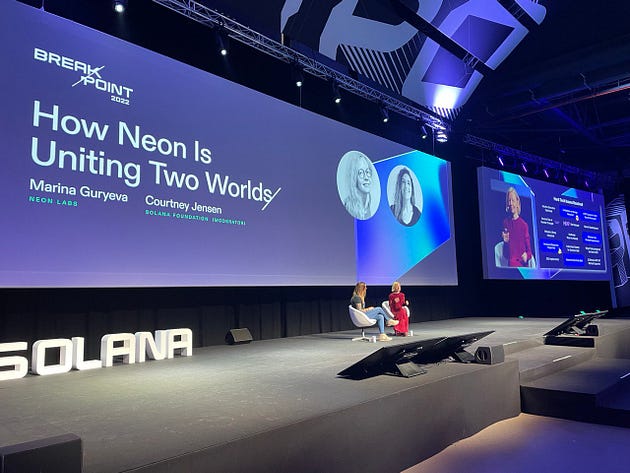Neon EVM will go Live on Mainnet: 12.12.2022


Neon EVM, an Ethereum virtual machine on Solana that enables dApps on Ethereum to scale and get access to liquidity on Solana, will go live on Mainnet on December 12, 2022.
Neon EVM will go live on Mainnet on Dec. 12, 2022, making it the first EVM on Solana. Without making any changes to their code, Ethereum-based applications will now have access to Solana’s scalability and liquidity.
Neon EVM will go Live on Mainnet on 12.12.22
The upcoming Mainnet launch of Neon EVM was made possible by their team’s hard work and ingenuity this past year in the face of some of the most difficult technological challenges in the blockchain.
Marina Guryeva, CEO and Founder of Neon Labs, was proud to share the behind-the-scenes work that had brought Neon EVM to this point at this year’s Solana BreakPoint event.


Marina also provided her thoughts on our upcoming Mainnet launch, saying:
“Neon EVM unites the best of two worlds, Ethereum and Solana, and puts to rest the Ethereum killer narrative once and for all. Ethereum-based projects can, for the first time, tap into the previously inaccessible audience and liquidity of Solana without needing to rewrite their code in Rust. As a result, users will now get to enjoy enhanced user experiences on Solana without losing out on Ethereum’s battle-tested dApps.”
Neon EVM is the first and only EVM on Solana, and it will have a profound impact on both the Ethereum and Solana ecosystems. For Ethereum projects aiming to expand into new ecosystems, differing programming languages are no longer a concern. Developers familiar with Solidity, Vyper, and the existing Ethereum smart contract languages can now use Neon EVM to deploy on Solana. Ethereum projects can now tap into Solana and access its large user base, which averaged 20.5M monthly active wallet addresses in the past three months. On the flip side, the Solana ecosystem will soon have access to Ethereum’s massive suite of dApps.
“Rather than looking at Ethereum, Solana, and other emerging L1s as disconnected blockchains, through Neon EVM’s launch we aim to foster multi-chain ecosystem growth by leveraging each blockchain’s respective strengths,” Marina continued.
The State of Technology

Their Mainnet debut is only the beginning. They will dive deep into the state of Neon technology and report on topics like dApp testing, performance testing, operators, the Neon Proxy, NeonPass, NeonScan, Tracer API, transaction indexing, tokens, gas prices, and governance in the sections below.
dApp Testing
In recent months, they have collaborated with MixBytes, Robonomics Network, and Zpoken to deploy and test popular Ethereum dApps on Neon EVM. A diverse set of dApps, including Compound, Uniswap v2, AAVE, Curve, Sobal, and Robonomics’ liability contract, were chosen to test Neon’s EVM compatibility. All of the use cases investigated were successful, and the underlying smart contracts worked properly and efficiently.
Read more about each performance testing scenario in the articles linked below:
- MixBytes Successfully Deploys Uniswap V2 Protocol on Neon EVM
- Robonomics Network’s Liability Contract is Successfully Executed on Neon EVM
- Zpoken Successfully Deploys the Compound Protocol on Neon EVM
Performance Testing
They ran a series of synthetic tests on Neon EVM and obtained results of 2000+ TPS. Synthetic tests only measure the speed of the Neon EVM smart contract without the use of Neon Proxy.
Neon Proxy
The Neon Proxy is require for converting a Neon transaction into a Solana transaction. It improves the user experience for operators in the Neon ecosystem and allows Ethereum dApps to be ported to Neon with almost no code or configuration changes because the proxy handles all “translation.”
Operators
Operators are an important part of the Neon ecosystem. There are no additional steps require after a user submits a transaction to Neon EVM to execute the instructions or store the data required for a transaction. Neon Operators and the operator’s software handle the complexities automatically. The cost of a transaction is ultimately determine by the transaction type. Operators use Neon Proxy, which aids in the execution of Ethereum-like transactions on Solana. This enables Ethereum dApps to be ported to Neon without requiring any code changes.
The operators of the mainnet will be listed here.
NeonPass
Solana and Neon will use NeonPass to transfer assets. It is important to know that NeonPass sends the original SPL asset from the source to the destination address. This “transfer” functionality is very different from the “bridging” functionality of standard blockchain bridges. Bridges encrypt original assets in smart contracts and create “synthetic” assets in destination blockchain ecosystems. These synthetic assets (also known as SPL-wrapped assets) are SPL versions of their associated ERC-20 counterparts in the context of Solana-Ethereum blockchain bridges.
Tracer API
The Tracer API is a Neon Proxy extension. They implemented a tracing API to assist developers in better testing, debugging, and understanding their Neon EVM smart contracts. The API will provide developers with a full externality trace on any transaction executed on the chain. They will be able to rerun historic transactions, create new transactions based on historic states, and analyze the state of the blockchain after each instruction is executed.
Wallets
Neon is an EVM environment and currently supports MetaMask.
Block Explorers
Their team has successfully integrated with NeonScan to provide the ecosystem with Block Explorer infrastructure. In a standard block explorer interface, NeonScan allows users to search the Neon blockchain for information such as block data, transactions, and addresses.
Indexing of Transactions
Aleph created a NeonAnalytics dashboard. The dashboard enables data querying on the blockchain, which results in more efficient dApp development for project teams.
Integration with The Graph protocol is underway to bring high-efficiency blockchain app. Querying to Neon EVM in an effort to further transaction indexing capabilities on Neon EVM; their team plans to run a Graph Node and will continue to build out tracing API services for use by dApps on Neon EVM.
Tokens
NEON, an SPL token used to pay for transactions and participate in DAO governance on Neon EVM.
Gas Price
Neon EVM inherits Solana’s low transaction fees. A Neon transfer costs 0.000015 SOL / tx and a simple swap costs 0.0002 SOL / tx.
Governance
Neon DAO will be live on day 1 of Mainnet launch. It will function as a normal DAO and use NEON as the governance token. Each token is equivalent to one governance vote.
Projects Being Built on Neon

Neon EVM will go Live on Mainnet
Beyond Mainnet

The road to Mainnet, focused on solidifying the Neon EVM proof of concept, testing key dApps, and developing new dApps.
Neon EVM stabilization, ERC-20 with SPL support, Halborn and Ackee security audits passed, NeonPass rolled out, and NeonScan launched
They will now focus on early dApp deployments, the Neon DAO governance rollout, maintaining a Mainnet-ready Neon EVM, and integration with The Graph.
Pyth and Chainlink support, as well as NFT interoperability with Solana and whitelisted operators.
Looking beyond Mainnet, their team will focus on exploring interoperability with Solana smart contracts. Neon ecosystem growth, the grants program launch, developing a decentralized operators network, Neon EVM full compatibility Ethereum, and supporting top industry ecosystem tools and services.
About Neon
Neon lets users run any Ethereum protocol on Solana, without any changes to its codebase. Including Uniswap, Sushiswap, 0x, MakerDAO, and countless others. In other words, Ethereum developers can soon deploy their apps to Solana, a blockchain that can process 50K transactions per second at $0.0025 apiece.
SOURCE
https://medium.com/neon-labs/neon-evm-set-to-go-live-on-mainnet-welcome-to-a-new-era-of-ethereum-scalability-on-solana-63b25bcc77a3
REQUEST AN ARTICLE




